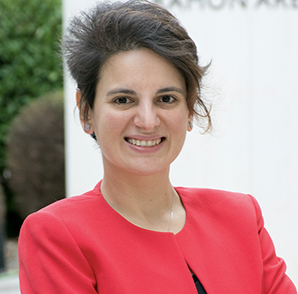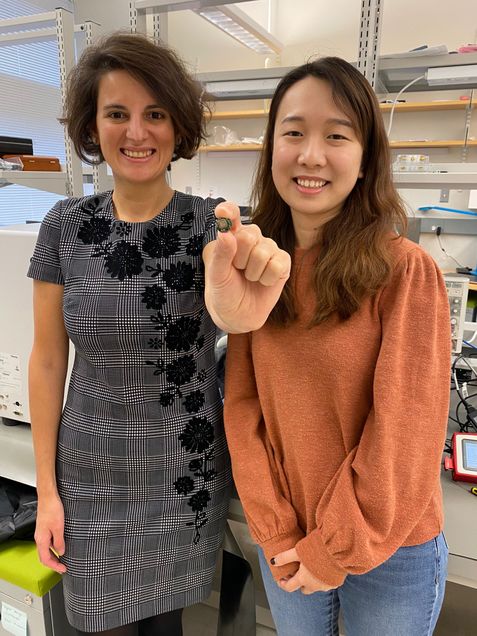Rabia Yazicigil Offers Insights on Energy-Constrained Systems

Rabia Yazicigil is a Professor of Electrical and Computer Engineering (ECE) at Boston University and leads the Wireless Integrated Systems and Extreme Circuits (WISE-Circuits) Laboratory. She became a CISE faculty affiliate in early 2020. Yazicigil joined the College of Engineering (ENG) in 2018 after working as a postdoctoral associate with MIT Dean of Engineering Anantha P. Chandrakasan. Yazicigil explained that ENG’s focus on the Societal Engineer was a driving factor in her decision to join Boston University.
“One of the most rewarding aspects of my work is seeing my effect on society,” says Yazicigil. “When I’m designing hardware, it feels like something is missing if it has no societal application.”
The WISE-Circuits group, led by Yazicigil, melds circuits with energy-constrained applications to develop breakthroughs in fields including bioengineering, information theory, and communications. Yazicigil’s group creates unique application-driven systems from abstracted foundations implemented in custom-integrated hardware.
Yazicigil brings her expertise in chip design to work with researchers across disciplines to solve challenges in healthcare and wireless technologies. “If you want to impact society, it helps to work with people from different fields to bring real solutions to complex problems.”

To improve disease diagnosis and customized treatments, Yazicigil is working with an interdisciplinary team affiliated with MIT, Brigham and Womens’ Hospital, and Harvard Medical School. Bringing expertise in electrical, biological, and mechanical engineering, and patient care, the team is designing an ingestible capsule for non-invasive and real-time monitoring of gastrointestinal (GI) tract health.
“We recently developed a miniaturized ingestible capsule for GI-tract disease diagnosis and monitoring. The multi-diagnostic capsule consists of genetically-engineered bacterial sensors interfacing with a custom readout system and a wireless transmitter. Our integrated photodetection readout chip only consumes nanowatts of power while providing high sensitivity and scalability. In the future, you can envision harvesting energy for this capsule from the GI tract without requiring a battery. All of this requires custom hardware design.”
Yazicigil has also teamed up with Professor David Starobinski (ECE) to harden the security of wireless ingestible and implantable medical devices (IMDs). “While IMDs offer the potential for improved health outcomes through continuous monitoring and treatment adjustments, attacks on wireless IMDs are dangerous due to the life-critical nature of these devices and the sensitivity/privacy of the data being exchanged,” explains Yazicigil.
Funded by a Spring 2021 CISE and ENG Seed Award for Innovative New Collaborations, the project aims to assess IMDs vulnerability to attacks and develop effective countermeasures. Yazicigil and Starobinski plan to test their solutions using wireless, energy-constrained IMDs to monitor inflammatory bowel disease.
Professors Yazicigil and Starobinski also recently received an NSF SWIFT Grant entitled “Facilitating Spectrum Access by Noise Guessing,” in collaboration with Professor Muriel Medard from MIT. The project will improve the spectrum utilization and assess the security implications of increased wireless data traffic. Due to continuous developments in Internet of Things (IoT) and wireless technologies, there has been a surge in wireless data traffic, which is reflected in the limited availability of radio frequencies and expanded attack surfaces.
A critical moment for Ph.D. students is deciding whether they want to pursue a career in academia or industry. Yazicigil ensures that students in the WISE lab experience diverse experiences in both camps to make an informed decision. If a student has a particular interest in a project, they will have the opportunity to take the lead. However, they will also work on side projects in other fields.
“My advice to students is to be flexible and open to new areas and to learning new things. Even if you’re going into industry, the field is always changing. It’s necessary to be open to change.”
Besides getting a sense of both academia and industry, diverse experiences help students hone their communication skills. “When students do collaborative work, it helps them learn how to communicate their ideas. Whether a student’s goal is success in research or industry, they have to be able to communicate well. Someone could be the best researcher, however, if they can’t communicate their ideas they won’t be able to make as big an impact.”
Undergraduates, as well as graduate students, have an opportunity to study under Yazicigil. She typically teaches the ENG EC 580 – Analog VLSI Circuit Design, ENG EC 571 – Digital VLSI Circuit Design, and ENG EC 410 – Introduction to Electronics courses.
“Working with students is one of the most fulfilling parts of my job because of the multiplying effect,” says Yazicigil. “You’re amplifying your impact by educating students because eventually, they start impacting their field and the people around them.”
Yazicigil received a BS in Electronics Engineering from Sabanci University in 2009, an MS in Electrical and Electronics Engineering from École Polytechnique Fédérale de Lausanne (EPFL) in 2011, and in 2016, she obtained her Ph.D. from Columbia University in Electrical and Electronics Engineering.
Learn more about Professor Yazicigil’s research here.